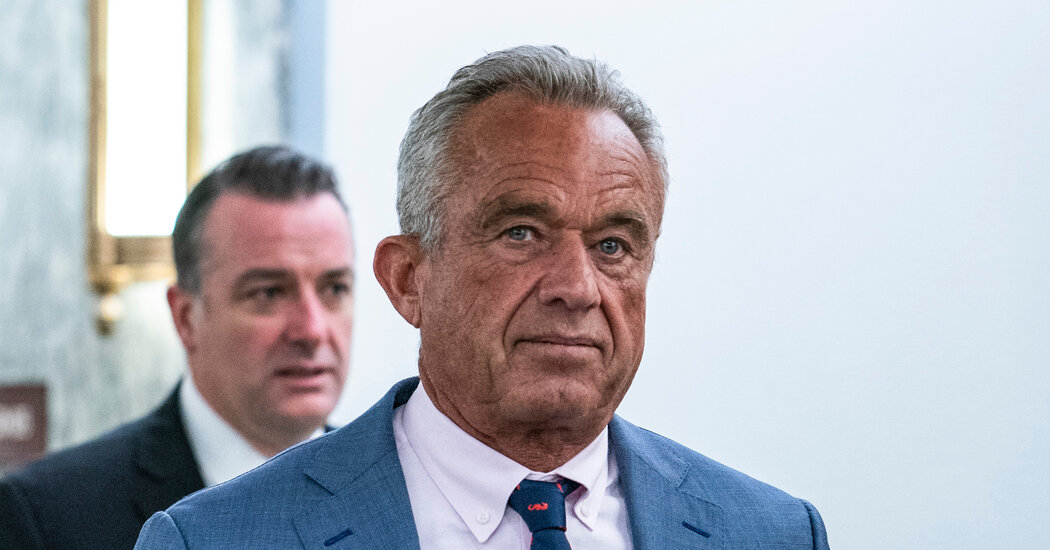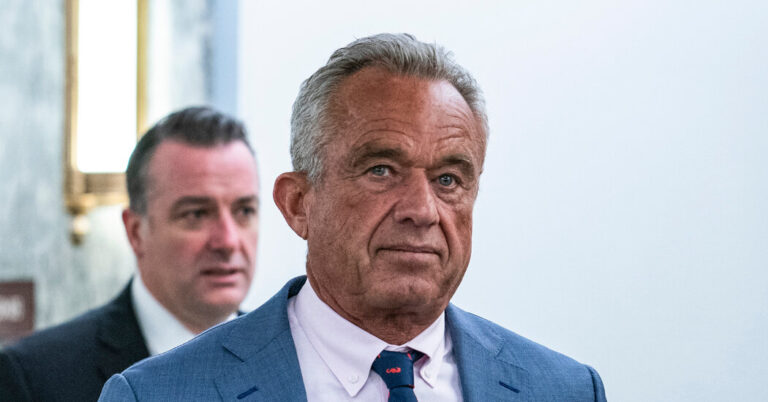Robert F. Kennedy Jr., President-elect Donald J. Trump’s pick to lead the nation’s health agencies, formally asked the Food and Drug Administration to revoke authorization of all Covid-19 vaccines during a deadly phase of the pandemic when thousands of Americans were still dying every week.
Mr Kennedy submitted a petition to the FDA in May 2021 asking that officials revoke authorization for the shots and refrain from approving any Covid vaccines in the future.
Just six months earlier, Trump had declared that the anti-Covid vaccines were a miracle. By the time Mr. Kennedy filed the petition, half of American adults were getting the shot. Schools reopened and churches filled.
Estimates had begun to show that the rapid rollout of Covid vaccines had already saved around 140,000 lives in the United States.
The petition was filed on behalf of the nonprofit organization founded and led by Mr. Kennedy, Children’s Health Defense. He said the risks of the vaccines outweighed the benefits and that the vaccines were not necessary because good treatments were available, including ivermectin and hydroxychloroquine, which had already been deemed ineffective against the virus.
The petition received little notice when it was filed. Mr. Kennedy was then on the fringes of the public health establishment, and the agency denied him within months. Public health experts said the documentation was shocking.
John Moore, a professor of immunology at Weill Cornell Medical College, called Mr. Kennedy’s request to the FDA “an appalling error of judgment.” Gregg Gonsalves, an epidemiologist at the Yale School of Public Health, likened Kennedy leading federal health agencies to “putting a flat Earther in charge of NASA.”
Dr. Robert Califf, commissioner of the Food and Drug Administration, described Kennedy’s effort to halt the use of Covid vaccines as a “huge mistake.”
Mr. Kennedy’s transition spokesman did not respond to requests for comment, but recently said he does not want to take away vaccines.
Asked in November by an NBC reporter about his general opposition to Covid-19 vaccines – and whether he would block authorization – Mr Kennedy said he was concerned that the vaccines did not prevent transmission of the virus.
“I wouldn’t have blocked him directly,” he said. “I would make sure we had the best science, and at that time there was no effort to do that.”
Kennedy’s early opposition to Covid-19 vaccines has alarmed public health experts, many of whom say it should disqualify him from overseeing health agencies with the power to authorize, monitor and allocate funding for millions of vaccines each year.
They are also concerned about how it might handle a possible avian flu pandemic, which could require a rapid rollout of vaccines.
As Kennedy prepares for his confirmation hearings before two Senate committees, he and his allies have insisted that he is not anti-vaccine.
In fact, in mid-2023, he told a House committee that he had taken all recommended vaccines, except for the Covid immunization.
In his confirmation hearings, he will most likely face scrutiny over his broader statements about vaccines, including that the polio vaccine has cost more lives than it has saved.
Trump stepped up in recent weeks to defend Kennedy after the New York Times reported that one of Kennedy’s lawyers had previously petitioned the FDA to revoke approval or suspend distribution of several polio vaccines over safety concerns.
“I think it’s going to be a lot less radical than people think,” Trump said last month.
After the Times article, Trump and Kennedy expressed their support for the polio vaccine.
If confirmed by the Senate as secretary of the Department of Health and Human Services, Kennedy would assume oversight of $8 billion in funding for the Vaccines for Children program and have the authority to appoint new members to a committee that makes influential vaccine recommendations for children. states.
At the time Kennedy challenged Covid vaccines, some of his objections touched on broader concerns about their rapid development. Emergency use authorization – a preliminary form of approval – for vaccinations was unusual. Others argued that a public health emergency forced a faster rollout.
Dr. Jennifer Nuzzo, director of the Pandemic Center at the Brown University School of Public Health, said it would be reasonable to discuss whether Covid vaccines should have been the subject of further study.
But he deeply disagrees with Mr Kennedy’s views, saying “the idea that at the start of 2021 we can say that people over the age of 65 don’t need Covid vaccines – that’s just crazy”.
Vaccines have rare side effects and there have been cases of injuries from Covid vaccines. Government officials weigh the damage against the potential to save lives. An estimate released in early 2024 found that Covid vaccines and mitigation measures have saved about 800,000 lives in the United States.
Another study found that in late 2021 and 2022, Covid death rates among unvaccinated people were 14 times higher than among those who received a booster vaccine. The researchers also estimated that from May 2021 to September 2022 more than 230,000 deaths could have been prevented among people who refused initial Covid vaccinations.
From the start of the Covid vaccine campaign, Kennedy’s view that Covid vaccines were dangerous put him at odds with Trump, whose Operation Warp Speed to develop vaccines was one of his political triumphs. And Mr. Kennedy has waged a concerted campaign against the vaccine.
In late 2021, Mr. Kennedy told Louisiana lawmakers that the Covid vaccine was the “deadliest vaccine ever made.”
He remained a plaintiff in a lawsuit against President Biden and others, challenging government officials’ efforts to limit his ability to suggest on social media that Covid vaccines were unsafe.
In January 2021, Mr Kennedy suggested on Facebook that the death of baseball legend Hank Aaron, 86, was linked to a Covid vaccine he had received 17 days earlier. It was “part of a wave of suspicious deaths” following Covid vaccines, he said. A doctor who was vaccinated along with Mr. Aaron and the county medical examiner rejected the request.
In May, when Mr. Kennedy petitioned the FDA to “immediately remove Covid-19 vaccines from the market,” he was joined by Dr. Meryl Nass, a member of the Children’s Health Defense scientific advisory board and a Maine physician.
His medical license was initially suspended on an emergency basis in early 2022 for prescribing ivermectin and hydroxychloroquine to patients with severe cases of Covid, including one who had been intubated, Maine Medical Board records show.
She later sued the board, claiming it had retaliated against her for exercising her right to free speech. The case is pending.
In 2022, Mr. Kennedy and others filed a lawsuit against the FDA on behalf of Children’s Health Defense and parents who said they were concerned their children were being given Covid-19 vaccines without their knowledge or consent. The amended lawsuit, filed in July 2022, sought a court order asking that the agency reconsider granting authorization for the Pfizer and Moderna Covid vaccines for children.
A Texas appeals court dismissed the case in early 2024, agreeing with a lower court that the plaintiffs did not face a “concrete or imminent” risk of harm. In June, the Supreme Court refused to hear the appeal.
Mr. Kennedy also sent letters to the FDA threatening legal action if authorizations were granted for vaccines for children.
Pfizer and Moderna’s Covid vaccines for infants and children ages 6 months to 11 years remain in use under emergency authorization, the companies are pursuing full approval for all ages, according to FDA spokespeople for Pfizer and Moderna.
In the censorship case, Kennedy said senior Biden administration officials had forced social media platforms to silence him, especially during the summer of 2021. At the time, vaccine rates were stalling. People who had not been vaccinated began dying at higher rates. Some of the dead were young; their loved ones said they were confused by the conflicting messages on social media — or regretted not getting the vaccine.
The lawsuit documents outline a briefing that summer with Jen Psaki, the White House press secretary at the time, and Dr. Vivek Murthy, the US surgeon general, both of whom criticized social media companies for allowing the spread of misinformation that was affecting people. against vaccination.
“And we can’t wait any longer for them to take aggressive action because it’s costing people’s lives,” Dr. Murthy said on July 15, 2021.
The following day, Biden expressed outrage, telling reporters that social media companies hosting vaccine misinformation were “killing people.”
In legal filings, Mr. Kennedy said he had been named one of the “disinformation dozen” by a major advocacy group — and that he was one of the people the White House was targeting. Documents in the lawsuit show White House officials relied on social media companies to weed out misinformation.
Within a month, a senior Facebook executive reported to Dr. Murthy that he had removed a number of pages or groups, including Mr. Kennedy’s, court documents show.
The Supreme Court rejected a related case last summer, and an appeals court rejected Mr. Kennedy’s case late last year. Lawyers representing Kennedy and others are still working to obtain depositions from about 30 people, mostly Biden administration officials.
Sheryl Gay Stolberg and Dylan Freedman contributed reporting.





